Resources
5 February 2023
10:30am
Where is Jesus in Psalm 110
On Good Friday, Jesus did something his disciples didn’t understand at all; he died on the cross. Three days later on Easter Sunday, he did something else they didn’t understand at all; he rose bodily from the dead and appeared to them. And in one resurrection appearance, when they were freaked out and thinking they were seeing a ghost, Jesus said (Luke 24.44-45, NIV):
This is what I told you while I was still with you: Everything must be fulfilled that is written about me in the Law of Moses, the Prophets and the Psalms.” Then he opened their minds so they could understand the Scriptures.
In other words the Old Testament. And that’s why we’ve had this Christ in the Psalms series. Because:
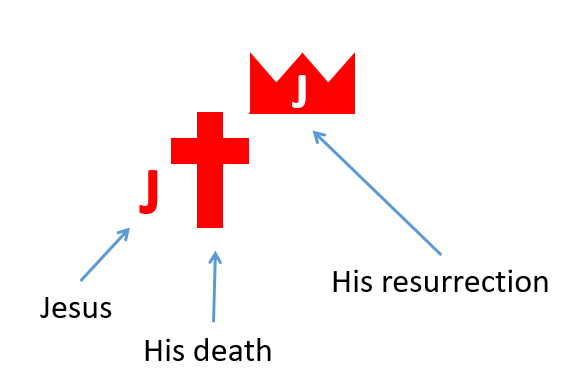
There’s Jesus and his death and resurrection – which is what the Christian message is all about.
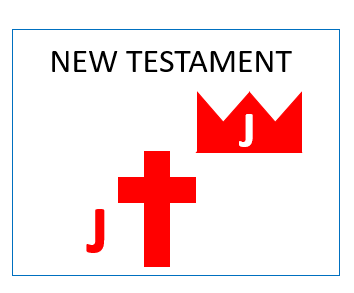
And we tend to think: ‘All I need to understand Jesus is the New Testament.’ But Jesus says, ‘No. If you want to understand who I am, why I came, and what it means to be in relationship with me, you also need:
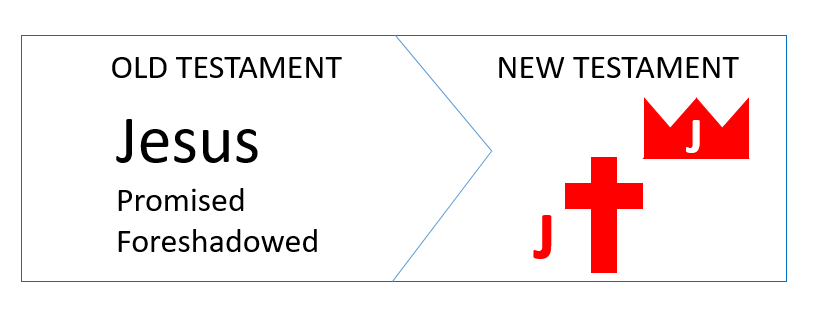
Luke 24.44:
Everything…written about me in the Law of Moses, the Prophets and the Psalms
In other words, we need the Old Testament as well. For all its promises about Jesus, but also for all the ways it foreshadows Jesus – in events like the Passover, in places like the temple, and in people like David; the prototype king of God’s Old Testament people. And because so many of the Psalms are by David or about David, it’s no surprise to find they foreshadow Jesus. We’ve looked at three of the most important Psalms quoted in the New Testament – Psalms 2, 8 and 22. But today we come to the Psalm which the New Testament quotes more than any other part of the Old Testament, which makes it super-important for understanding Jesus. It’s Psalm 110. And we need help to understand it, so let’s pray:
Lord Jesus, we think of that resurrection appearance where you ‘opened their minds so they could understand the Scriptures.’ And as we come to this Psalm which you must have opened to them, we pray that you would open our minds, too, and help us to see you in it. In your name, Amen.
So would you turn in the Bibles to page 509 and Psalm 110. Now where it says above the 110, ‘Sit At My Right Hand’, that’s just a heading put in by the ESV Bible translators. It’s not part of the original, God-given text of the Bible. But wherever you see a Psalm heading in capitals in the ESV, it is part of the original, God-given text. So here it says:
A Psalm of David
And as we’ll see later, Jesus said that meant David wrote it. So look at Psalm 110.1-2:
The Lord says to my Lord:“Sit at my right hand,until I make your enemies your footstool.”The Lord sends forth from Zionyour mighty sceptre.Rule in the midst of your enemies!
So what’s going on here? It’s not a prayer out of some personal experience – like last week. It seems to be a vision or prophecy about Christ.
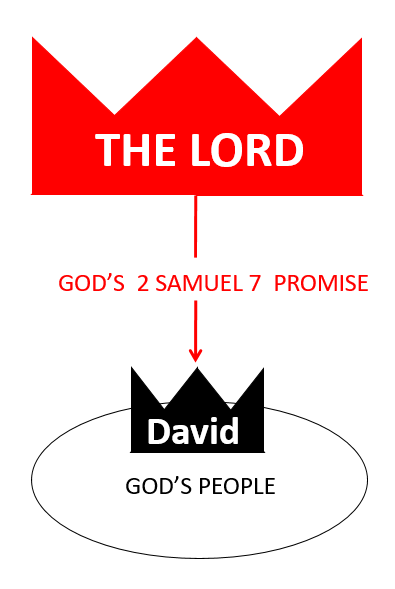
So let me remind you again of God’s promise to David in 2 Samuel 7.12-16:
When your days are fulfilled and you lie down with your fathers, I will raise up your offspring after you, who shall come from your body, and I will establish his kingdom. He shall build a house [as in a temple] for my name, and I will establish the throne of his kingdom for ever. I will be to him a father, and he shall be to me a son. When he commits iniquity, I will discipline him with the rod of men, with the stripes of the sons of men, but my steadfast love will not depart from him, as I took it from Saul, whom I put away from before you. And your house [as in your dynasty] and your kingdom shall be made sure for ever before me. Your throne shall be established for ever.’
And I assume that as David thought about that promise, the LORD showed him that one day it would be fulfilled in a more than merely human successor or son of David.

Because, like this next picture says, the way to have a forever kingdom is one day to have a forever King – who’s more than merely human. So not just another, same-as son of David, but the ultimate Son of David. And remember: David, like his sons, was known as the Lord’s anointed king, or ‘christ’ – small ‘c’ christ if you like. So another way of putting it is that the way to have a forever kingdom is one day to have not just another, same-as small ‘c’ christ, but the ultimate, capital ‘C’ Christ. And in Psalm 110 David has this vision of a conversation between the LORD and that forever King, that ultimate Son of David, that ultimate Christ.

So look at this next picture. There’s the LORD, God. And under him, there’s David, 1,000 years before Jesus, and currently the LORD’s anointed king or small ‘c’ christ. But in Psalm 110.1, David says;
The Lord says to my Lord:“Sit at my right hand,until I make your enemies your footstool.”
So he’s overhearing this conversation between the LORD and someone David calls my Lord. So look at this next picture:
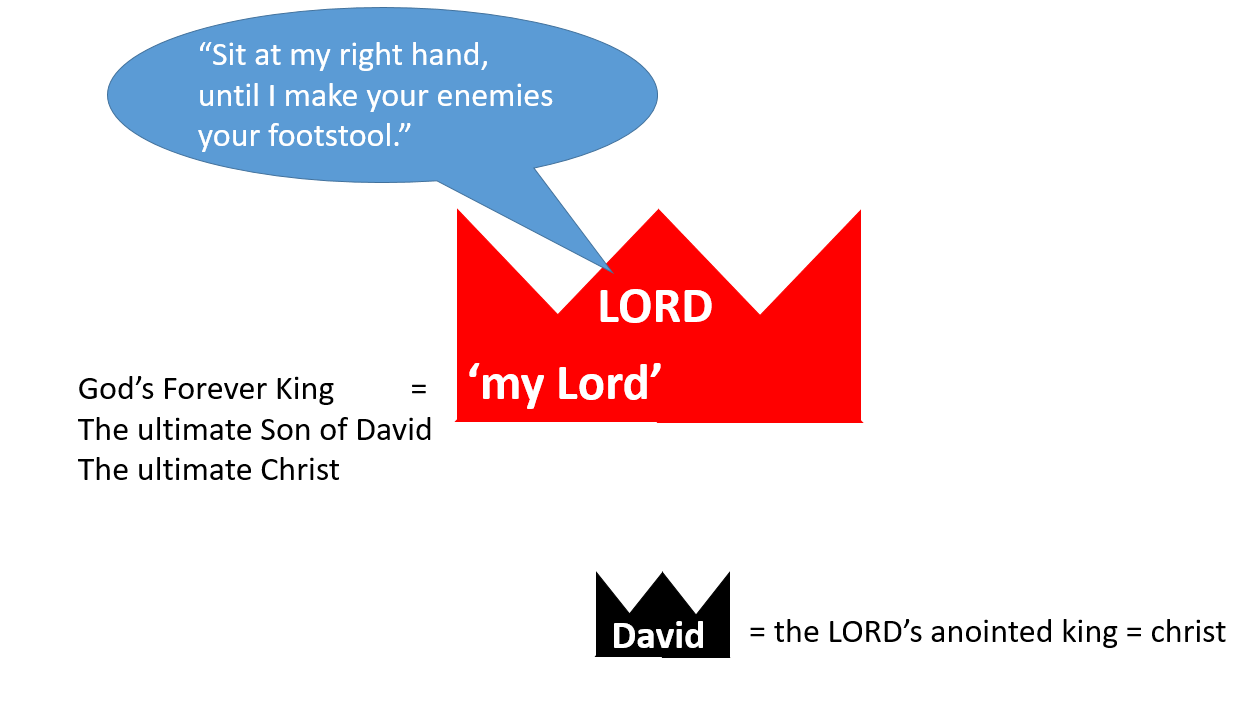
Who is this figure that David calls my Lord? Well, he’s clearly above David – which is why David calls him my Lord, and if he’s at God’s right hand, sharing God’s rule, it looks like he somehow is God. So this is one of the Old Testament passages which hint that God is more than one person. And this my Lord figure looks like he’s God’s forever King, the ultimate Son of David, the ultimate Christ, who’s both human and divine. And in case you’re thinking I’m pulling rabbits out of hats, that interpretion comes straight from Jesus. So in the final showdown before the cross, when Jesus confronted Israel’s godless leaders and cleared the temple courts, they said (Mark 11.28):
By what authority are you doing these things?
In other words, “Who do you think you are?” And in the argy bargy that followed, Jesus turned on them and said this (Mark 12.35-37):
How can the scribes say that the Christ is the son of David?David himself, in the Holy Spirit, declared,[and here’s Psalm 110 – quote:]“‘The Lord said to my Lord,Sit at my right hand,until I put your enemies under your feet.’David himself calls him Lord. So how is he his son?
So Jesus was saying the my Lord figure in Psalm 110 is the ultimate son of David = Christ whom they were expecting. But then he says, ‘Isn’t it strange that David calls him my Lord?’ Because to them, your descendents were never greater than you. So David would always be thought greater than his sons and grandsons and so on, down the tracks. But Jesus says: here’s David in Psalm 110 calling his son at the very end of the tracks Lord. In other words, the my Lord figure is of a completely different order greater than David – sharing God’s rule, and somehow God himself. And Jesus is saying, ‘You want to know by what authority I’m doing these things? You want to know who I think I am?’ Well, think hard about Psalm 110.1, and you’ll see.’
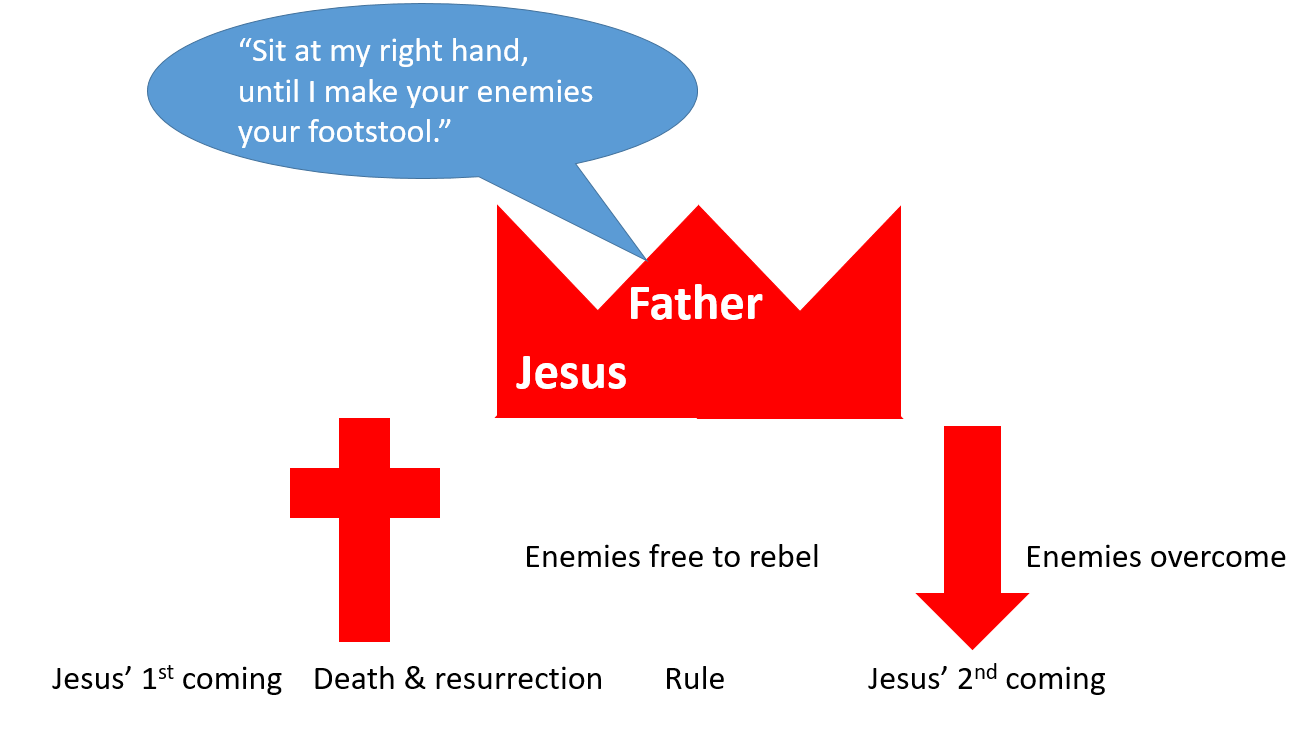
So here’s the picture of how to read Psalm 110.1, christianly. Jesus has come a first time. He’s died for our forgiveness. He’s risen again. And he’s back in glory, with his Father saying to him:
Sit at my right hand,until I make your enemies your footstool.
Which means that right now his enemies are still free to rebel against him – that’s why that word until is there. So even though Jesus is the rightful King of everyone in the world today, anyone can choose to ignore him and say, ‘I don’t want you ruling my life.’ But the results of our rebellion will sometimes, maybe often, leave us crying, ‘Won’t you stop it?’ Like the war poet Siegfried Sassoon did at the end of his poem Attack:
The barrage roars and lifts. Then, clumsily bowedWith bombs and guns and shovels and battle-gear,Men jostle and climb to meet the bristling fire.Lines of grey, muttering faces, masked with fear,They leave their trenches, going over the top,While time ticks blank and busy on their wrists,And hope, with furtive eyes and grappling fists,Flounders in mud. O Jesus, make it stop!
But he hasn’t – yet. And we need to remember that the moment he does, all opportunity to change sides is gone. And the reason the human race has another day today to rebel against God and to fight its wars and commit its evils is that God is giving people another day to turn to Jesus, and be forgiven and change sides – before he comes again. And Psalm 110.3 is a vision of those who do change sides:
Your people [so David’s now speaking to the Lord Jesus – although he didn’t know that name yet – your people] will offer themselves freely [that’s the word for being completely willing, gladly giving yourself – Your people will offer themselves freely] on the day of your power [the footnote says ‘on the day you lead your forces’ – which is really the whole time between Jesus’ 1st and 2nd comings], in holy garments; from the womb of the morning, the dew of your youth will be yours.
So Psalm 110.1-2 give us a picture of Jesus as a King with absolute power – who will one day overcome his enemies. So you might have expected Psalm 110.3 to picture his people as conscripts, forced onto his side against their will because that’s how it would be with an ordinary human king with absolute power. That’s the story of many in Putin’s army. But instead it says:
Your people will offer themselves freely
Because this King, amazingly, has offered himself first for them on the cross. And he doesn’t force anyone onto his side. He only calls and loves and forgives people onto his side. Which is what he’s doing to you this morning, if you’re not there already. And which is why, after communion, we’ll say that prayer:
Almighty God, we thank you for feeding us with the body and blood of your Son Jesus Christ. Through him we offer you our souls and bodies to be a living sacrifice.
Because healthy Christians, who are remembering the cross, don’t say to themselves, ‘I have to serve him,’ but, ‘I want to.’ They don’t say, ‘I’ve got to live like this’ – but ‘Hey, I get to live like this. I get to live a new life in Christ.’ So really, Psalm 110 is a vision of the kind of King Jesus is, a human and divine king, an absoloute king, who’ll one day overcome all enemies, and yet, a king who allows us freedom to rebel, and wins hearts and minds through his love. But the other thing to notice is that Jesus is also a priest-king.
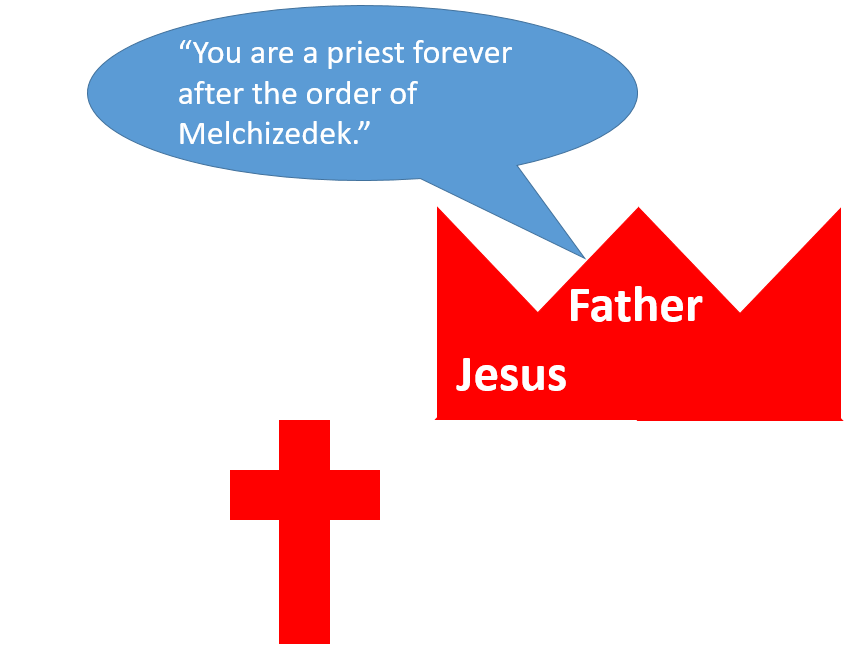
So here on my next picture is the other thing the LORD says to my Lord (Psalm 110.4):
The Lord has swornand will not change his mind,“You are a priest for everafter the order of Melchizedek.”
So just think back to when God gave his law to his Old Testament people through Moses. If I were to ask you: what was central to it, I wonder what you’d say? The Ten Commandments? The command to love God or our neighbour? Those were important for knowing how to live in relationship with God.
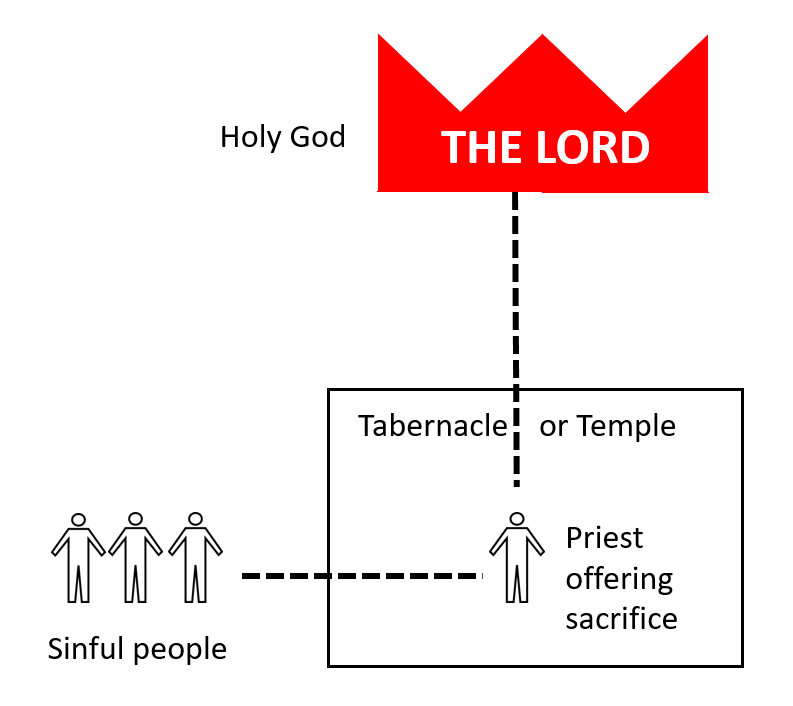
But for being in that relationship in the first place, and for staying in it, the central thing was the tabernacle (later the temple) because it was the God-given way that sinful people could relate to a holy God. In some ways, it was like the router in your house which connects your devices to the internet. It was there to connect sinful people who needed forgiving with a holy God who was willing to forgive. And at the heart of it was the God-given ministry of priests (which just means go-betweens) who offered sacrifices. But those Old Testament sacrifices were only pictures of how much forgiveness costs. They never actually paid for anyone’s forgiveness – only Jesus’ sacrifice coming up in the future did that for Old Testament believers, because the cross worked backwards in time for them, as well as forwards in time for us. But those Old Testament sacrifices did teach people that forgiveness was possible and available, through God-given sacrifice. And as David thought about the priests and sacrifices, I assume the LORD showed him they could never solve the sin-problem. So he would have thought how generation after generation after generation of priests had offered sacrifice after sacrifice after sacrifice. And the very fact they kept doing it showed they could never really solve the sin-problem.
It’s like round our way: council worker after council worker after council worker fills in pothole after pothole after pothole. And then another lot come and re-fill the same holes because they need doing all over again. And you realise none of them has really solved the problem. None has provided the radical new road we really need. And it was like that with the priests and sacrifices. So inspired by God, David realised that much earlier in the Bible than the law and its priests, the Lord had planted a major hint of how he was going to solve the sin-problem. It’s in Genesis 14 and it involves this mystery man Melchizedek. So Abraham had just fought and beaten some local city-king-thugs who’d kidnapped his nephew Lot. And on his way back past Jerusalem we’re told (Genesis 14.18-20):
And Melchizedek king of Salem [ie, Jerusalem] brought out bread and wine. (He was priest of God Most High.) And he blessed [Abraham aka Abram] and said, “Blessed be Abram by God Most High, Creator of heaven and earth; and blessed be God Most High, who has delivered your enemies into your hand!” And Abram gave him a tenth of everything.
And that’s all we hear about Melchizedek. But what David saw was that Melchizedek was king and priest together. In David’s time, those roles were separate – David was king and the priests were priests. But as God gave him this Psalm 110 vision, it seems David was shown that ultimately, God would re-combine those two roles into one person – to whom he would say (Psalm 110.4):
You are a priest for ever after the order of Melchizedek.
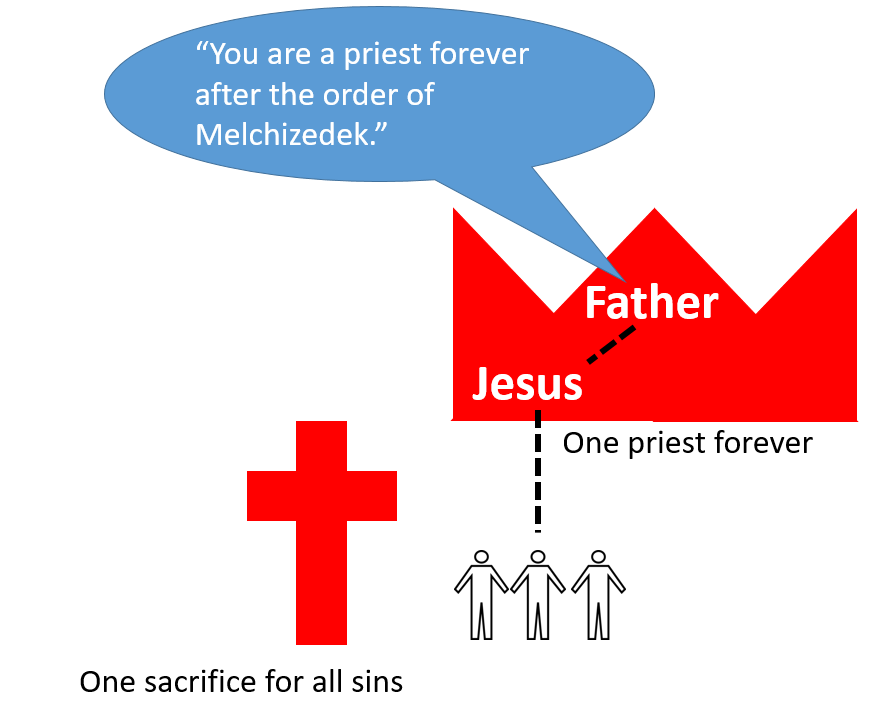
And so there’s the rest of the picture of how to read Psalm 110 Christianly. There’s Jesus’ one sacrifice on the cross that really did pay for the forgiveness of all sins. And there’s Jesus, risen from the dead, back with his Father, and the priest forever through whom we can be forgiven for everything always. And please don’t get the picture of God the Father reluctant to forgive, with Jesus persuading him to on the strength of the cross. Because it was God the Father’s plan to give us his Son as our sacrifice and priest in the first place. And if you go to Biblegateway.com and search ‘Melchizedek’, you’ll find him in Genesis 14, Psalm 110 – and then right through Hebrews 5 to 7 – which spell out in detail what I’ve only had time to sketch. So to end with, just look at this picture one last time.

That’s a picture which says: Jesus and his death is all you need to be in relationship with God just as you are, to come to God just as you are. But we find that so hard to believe. And we all slip into thinking that we need to be our own little priests, offering our own little sacrifices to God so that he’ll accept us again after we’ve sinned. So let me mention two of the favourite offerings I think we try to bring to the Lord. One is the offering of being sorry enough. And we use that especially for the big things on our consciences, and we say to God, ‘Please will you forgive me – because here’s my offering of how sorry I’ve been – even of how I’ve punished myself.’ And the Lord says, ‘I’ve given you the only priest you’ll ever need. And he’s offered the only sacrifice you’ll ever need. So take your eyes off how sorry you feel, and come to me through him and be forgiven.’ The other thing we try bringing God is the offering of trying harder in future. And we use that especially for the sins we struggle with and fail in repeatedly. And we say to God, ‘Please will you forgive me – because here’s my offering of how I’m going to try harder, how I’m going to change, how I’m going to beat this thing.’ And the Lord says, ‘I’ve given you the only priest you’ll ever need.
And he’s offered the only sacrifice you’ll ever need. So take your eyes off how you’re doing or will do in future, and come to me through him and be forgiven.’
Well, that’s the last of this mini-series on Christ in the Psalms. I hope it’s helped us see that the Psalms, as much as the rest of the Old Testament, point forward to Jesus. And I hope these Psalms have helped you see Jesus more clearly – and maybe in ways you never have before. Let’s pray.
